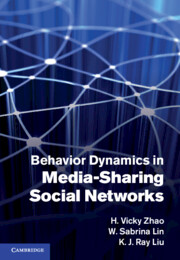Book contents
- Frontmatter
- Contents
- Preface
- Part I Introduction
- Part II Behavior forensics in media-sharing social networks
- Part III Fairness and cooperation stimulation
- 8 Game-theoretic modeling of colluder social networks
- 9 Cooperation stimulation in peer-to-peer video streaming
- 10 Optimal pricing for mobile video streaming
- Part IV Misbehaving user identification
- Part V Media-sharing social network structures
- References
- Index
8 - Game-theoretic modeling of colluder social networks
from Part III - Fairness and cooperation stimulation
Published online by Cambridge University Press: 28 April 2011
- Frontmatter
- Contents
- Preface
- Part I Introduction
- Part II Behavior forensics in media-sharing social networks
- Part III Fairness and cooperation stimulation
- 8 Game-theoretic modeling of colluder social networks
- 9 Cooperation stimulation in peer-to-peer video streaming
- 10 Optimal pricing for mobile video streaming
- Part IV Misbehaving user identification
- Part V Media-sharing social network structures
- References
- Index
Summary
As shown in Chapters 5 and 6, cooperation enables users in a social network to access extra resources from others and thus to receive higher payoffs. Meanwhile, each user also contributes his or her own resources to help others. However, because the nature of participation nature in many media-sharing social networks is often voluntary and unregulated, users' full cooperation cannot be guaranteed, and a critical issue to be resolved first is to analyze when users will cooperate with each other and design cooperation strategies. In this chapter, we use colluder social networks in multimedia fingerprinting as an example, and analyze when users will collaborate with each other and how they reach agreements.
For a colluder in multimedia fingerprinting systems, the first issue to address is to decide whether he or she would like to participate in collusion and with whom he or she would like to collude. When colluders' goal is to minimize their probability of being detected, a collusion attack with more attackers reduces the energy of each contributing fingerprint by a larger ratio and, therefore, each colluder has a smaller chance of being caught. Thus, to minimize the risk, colluders are always willing to cooperate with one another because it reduces all colluders' risk, and a colluder should find as many fellow attackers as possible.
Nevertheless, colluding with more attackers also means sharing with more people the reward from illegal usage of multimedia and, therefore, colluders may not always want to cooperate.
- Type
- Chapter
- Information
- Behavior Dynamics in Media-Sharing Social Networks , pp. 131 - 168Publisher: Cambridge University PressPrint publication year: 2011



